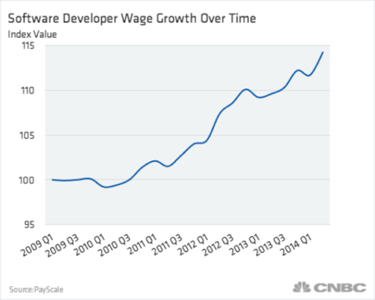Nearly 10 years ago, Excite founder Joe Kraus, now an investor at Google Ventures, declared “there has never been a better time to be an entrepreneur.” Kraus was talking about the economics of startups—the cheapness of servers, networks, and other raw ingredients of computing.
A decade later, Andreessen Horowitz investor Sam Gerstenzang has one-upped Kraus. In a recent blog post, he argues that it’s not just costs that are at historic lows. So, too, is the level of competence required to engineer a product.
In other words, even an engineering nobody can start a company.
No Money? No Problem!
While it seems quaint now, it used to be expensive to build an app and start a company around it. Hardware was expensive. Software was expensive. Storage was expensive.
Engineers, however, were relatively cheap.
As Kraus noticed in 2005, however, things were starting to change. By that time “hardware [had] literally become 100X cheaper…. Back in the Excite days, we had to buy proprietary Sun hardware and Sun hard drive arrays…. Today, we buy generic Intel boxes provided by one of a million different suppliers.”
Furthermore, he wrote, “back in 1993 we had to buy and continue to pay for maintenance on everything we needed just to build our service—operating systems, compilers, web servers, application servers, databases. You name it.”
“Not only was it costly,” he writes, but “the need to negotiate licenses took time and energy.”
By 2005, however, “Free, open source infrastructure [was] the norm,” with the ability to “get it anytime and anywhere.”
As a result, “More people can and will be entrepreneurs than ever before” because “a lot more people can raise $100,000 than raise $3,000,000.”
Developers Don’t Get Cheaper
One thing Kraus didn’t mention, however, was that even as other costs got cheaper, the cost of a good developer kept going up. The relative cost of a hiring a developer and acquiring storage, for example, looks like this:

In 1985, storage was a key expense, running $100,000 per gigabyte, while a developer could expect to get paid $28,000 per year.
By 2013, things had changed considerably. Now storage is cheap, costing $0.05 per GB. Developers, on the other hand, are expensive: $90,000 per year.
Today, engineering pay is at an all-time high, and rising fast:

According to Gerstenzang, whose firm has backed Instagram, Pinterest, and other big Internet names, that may be about to change.
The Rise Of The Average Developer
Citing the acquisitions of engineer-light and user-heavy companies like Snapchat and Instagram, Gerstenzang posits that “fewer engineers and dollars to ship code to more users than ever before” is “the new normal,” making “the potential impact of the lone software engineer … soar[].”
And as impact goes, so does cost.
However, Gerstenzang notes that much of the hardest engineering is now done for developers: Amazon Web Services and other platform or infrastructure providers abstract away the most difficult engineering problems, making it easier to code—or downright unnecessary:
[T]he barriers to becoming a code creator are falling fast. The same software foundation (open source software, development tools like Github, infrastructure as a service provided by the likes of Digital Ocean, and more) that allowed Whatsapp and Imgur to scale, means that experience and skill writing software become less important.An individual can now scale a web app to millions of users with Digital Ocean, Heroku and AWS (perhaps coordinated by Mesosphere). It no longer requires a sophisticated understanding of MySQL parameters to scale a database on Google App Engine, just as it no longer requires a knowledge of the CPU chip it’s all chugging away on.
In other words, there has never been a better time to be average.
Sure, there will still be a need for “10x engineers,” those superwomen and supermen that are “still needed to build the foundation [e.g., infrastructure].” But, he concludes, “[A]s we build out the common foundation, the skill and experience an individual needs to accomplish a task on top of the platform decreases.”
Not only does it decrease, but it may actually go away:
Today, if you have a great idea for a software product, you need to either be an engineer or find one. Tomorrow, that billion-dollar startup acquisition might not need an engineer at all.
For the English majors of the world, life just got much better.

















